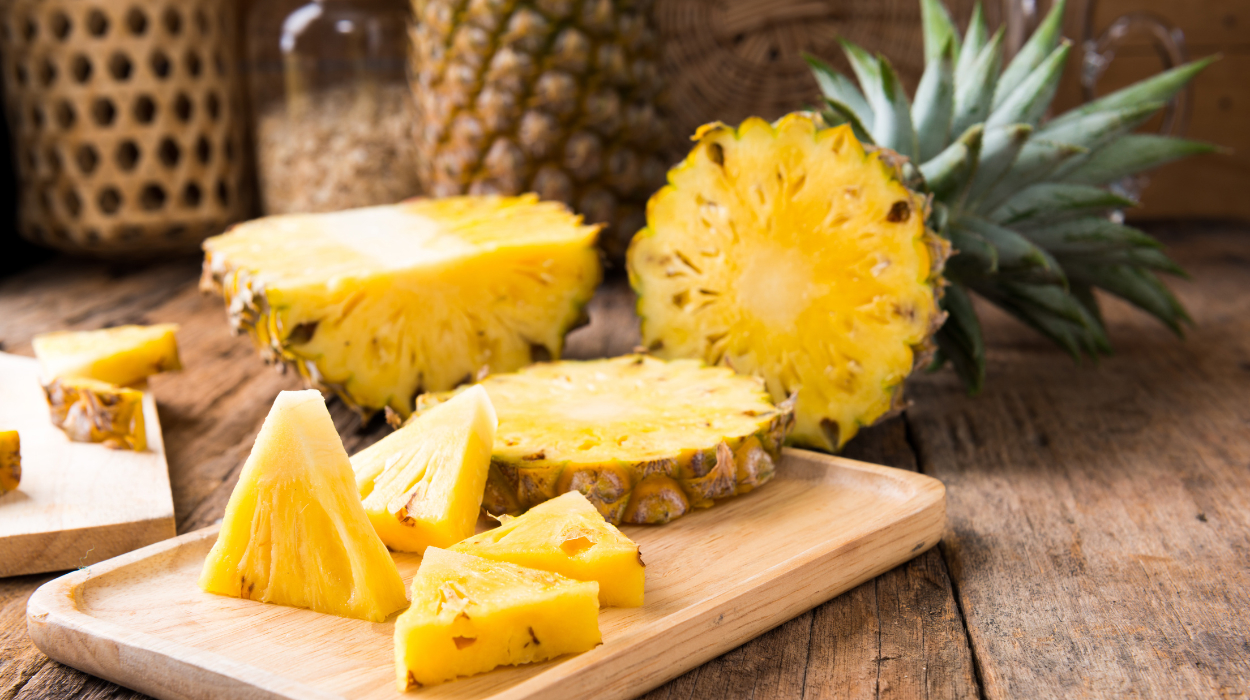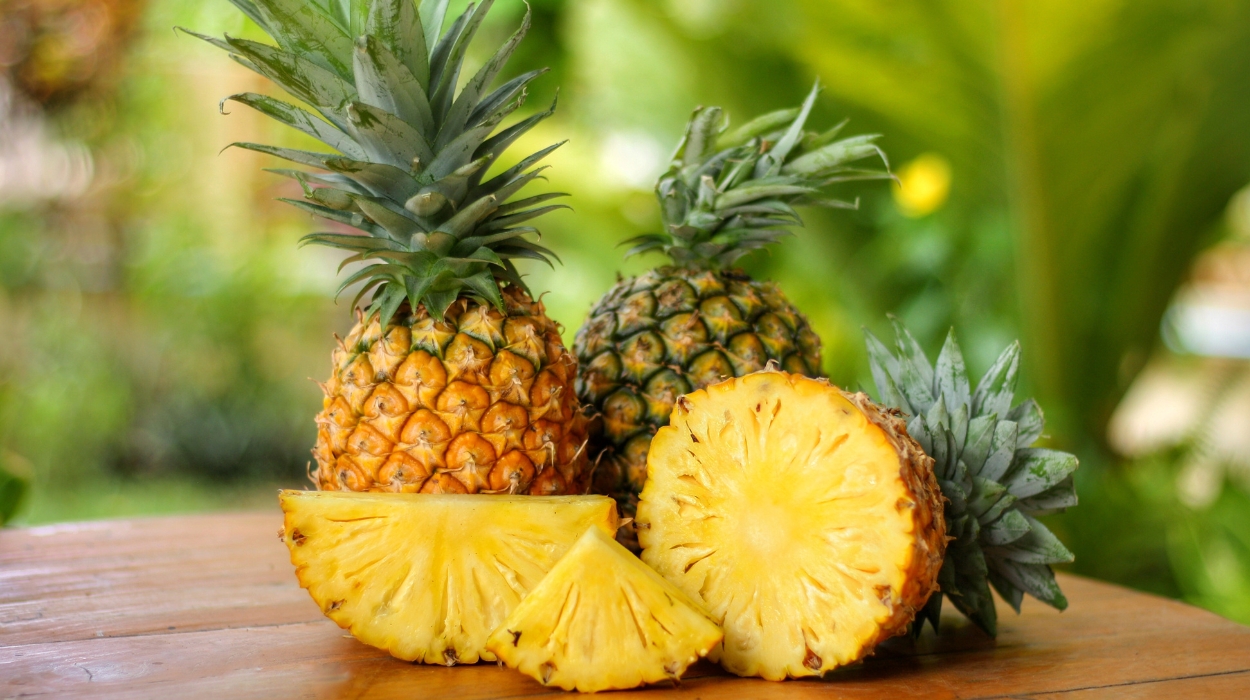Thinking about pineapple often conjures images of island vacations and fruity drinks. It’s a naturally sweet tropical fruit that is very versatile. You can consume pineapple in a variety of ways for any meal — breakfast, lunch, dinner, or dessert.
Pineapple contains vitamins and minerals, making it a nutritious addition to a healthy diet. This juicy fruit provides health benefits due to its bioactive compounds[1] and other nutritional components.
It can be healthy, but is pineapple good for weight loss? Losing weight can be a challenging process that requires eating in a calorie deficit. Fruit is a low-calorie food that can help you achieve your weight loss goals.
A way to incorporate more fruit into your diet is by drinking weight loss smoothies — bananas, berries, and pineapple make delicious and nutritious smoothie ingredients. Let’s explore pineapple further to learn all of its potential weight loss benefits.
Can Pineapple Help Boost Weight Loss?
Pineapple is a healthy fruit containing essential nutrients plus phytochemicals that promote health benefits. The bioactive components in pineapple provide anti-inflammatory properties that help decrease the risks of diabetes and heart disease and support weight management.
Is Pineapple Good For Weight Loss?

A common misconception is that you should avoid or limit fruit during a weight loss journey. However, while there is a need for continued research, consuming fruit as part of a healthy, low-calorie diet actually exhibits anti-obesity effects.[2] Dietary fiber and phytonutrients found in fruit are two of the contributing factors to fruit’s weight management and health benefits.[2]
A physiological and molecular study involving high-fat diet-induced rats resulted in increased body fat, body mass index, fatty liver, and high cholesterol. The high-fat diet and control group rats were given pineapple juice, and the high-fat rats showed improvement in all health markers.[3] Also noted were reduced blood sugar and leptin, which helps regulate metabolism, plus increased adiponectin which enhances insulin sensitivity — all of these processes are promising for decreasing obesity.
A similar study utilized high-fat diet mice and pineapple vinegar. The high-fat diet mice were given highly concentrated pineapple vinegar as treatment. The treatment significantly reduced the mice’s body weight,[4] restored cholesterol values, and provided increased antioxidant activities, reducing cell damage.
A 2021 study involving pineapple to determine its effects on heart health[5] indicated it has cholesterol-lowering properties. A secondary finding was that the pineapple group demonstrated decreased body weight[5] after eight weeks compared to the control. The results indicated pineapple can support body weight management.
Thus, different forms of pineapple seem to offer health benefits, including weight loss, cell repair, and improved cardiovascular and obesity health markers. Is pineapple juice good for weight loss? Research is not conclusive in humans but shows promise for weight reduction.
Weight-Loss-Friendly Benefits Of Pineapple

There are numerous reasons pineapple is a healthful addition to your diet. Pineapple is a low-calorie fruit packed with essential nutrients, including vitamins, minerals, and fiber. The nutritional value of one cup of pineapple chunks[6] contains 88% of the daily recommended amount[7] of vitamin C, which supports immune health.[8]
Additionally, it provides:
- Calories: 83 kcal.
- Fat: 0.2 grams.
- Carbohydrates: 22 grams.
- Fiber: 2.3 grams.
- Sugar: 16 grams.
- Protein: 0.9 grams.
Furthermore, pineapple contains several B vitamins, phytochemicals, and bioactive compounds, such as phenolic acids and flavonoids. Phenolic and flavonoid compounds[5] seem to support body weight control and promote health benefits, such as decreasing cholesterol and heart inflammation. Research indicates these compounds are associated with reduced fat cell[9] accumulation and may aid fat burning.
The high dietary fiber content in pineapple promotes digestive health,[5] improving gut microbiota and enhancing the short-chain fatty acid production in the gastrointestinal tract. These processes are associated with body weight control. Pineapple consumption is also associated with decreased health markers related to obesity, such as reduced blood sugar and cholesterol.[5]
Pineapple is a good source of bromelain,[10] a proteolytic enzyme that breaks down protein and offers other health benefits like improved digestion and decreased heart disease risk. Bromelain also boasts anti-inflammatory, anticancer, and antimicrobial[10] properties. Still, further research is required to determine the potential of eating pineapple for medicinal purposes as well as for weight loss.
Factors Required For Weight Loss
Losing weight requires a multi-faceted approach combined with consistent effort and persistence since results take time. In addition to eating a healthy, low-calorie diet, you must eat in a calorie deficit by consuming fewer calories than you burn daily. Let’s look at other factors that are necessary to achieve your weight loss journey goals.
- Eat plenty of fruit, vegetables, whole grains, healthy fats, and lean protein.
- Try meal planning. Experts report that when meals are planned, they contain better nutritional components. Plus, you are less likely to eat fast food or lower nutritionally valued foods.
- Schedule time for and perform regular physical activity[11] to ensure you attain the recommended amount of at least 150 minutes of moderately intensive exercise per week. Try to perform resistance training two days a week.
- Avoid or limit processed foods, sugar-sweetened beverages, and alcohol.
- Get adequate sleep since lack of sleep is associated with adverse health effects.
- Manage your stress level because prolonged elevated stress is linked to weight gain.
- Drink plenty of water to stay hydrated, plus it may help suppress appetite.
- Consider using dietary supplements to support fat burning, boost metabolism, and suppress appetite.
- Add greens or fruit and veggies to your diet. Supplemental powders or shakes can help you increase your intake of these necessary foods. You may also consult a registered dietician if you feel you may be lacking proper nutrition.
Ways To Eat Pineapple For Weight Loss
A weight loss diet requires decreased caloric intake. Fruit is a carbohydrate-dense food, so it’s essential to be mindful of your portion sizes. Fruit can be part of a healthy diet when eaten mindfully and with a heightened awareness of calorie deficit goals.
For instance, if you plan to add more fruit to your diet for health benefits but are also on a weight loss plan, you must account for the change in calorie consumption. Otherwise, you may be at risk for weight gain. Here are some options to add delicious pineapple to your healthy, low-calorie diet.
- Eat pineapple chunks with low-sugar yogurt for breakfast.
- Top oatmeal or a salad with pineapple.
- Add dried pineapple to your trail mix or granola.
- Make a stir-fry with pineapple.
- Cook pineapple fried rice in the air-fryer to decrease added oil.
- Grill pineapple slices as a side dish.
- Mix up pineapple and greens in a smoothie for added nutrients.
- Blend into a smoothie bowl with acai and bananas
- Make fresh pineapple juice.
- Make pineapple ice cream or sorbet. No sugar added is best.
Reading labels is important if you buy fruit products versus whole fruit. Remember to consider prepacked products often have added sugar. So, if you are purchasing canned pineapple or pineapple juice, check the label to ensure no sugar has been added.
Conclusion
In summary, pineapple is a healthy, low-calorie fruit that contains essential vitamins and minerals. It is an excellent source of bioactive compounds that provide anti-inflammatory properties and offer health benefits. Pineapple’s dietary fiber and natural components have anti-obesity effects, provide heart health benefits, and support proper digestion.
Does pineapple help you lose weight? Research studies indicate it supports weight loss and can be a good addition to most diets. All in all, pineapple can support a healthy lifestyle.
Pineapple can satisfy your sweet tooth, provide your body with many health benefits, and may help you lose a few pounds. If you have questions about adding pineapple to your diet, consider meeting with a registered dietitian to address your unique nutrition needs.
Frequently Asked Questions
Pineapple provides bioactive components that support fat burning and help reduce fat accumulation.
One cup of pineapple chunks contains 16 grams of sugar, so you should adjust your portion sizes accordingly if consuming other sugary foods.
Research indicates pineapple juice is associated with reduced body fat.
The answer to this question will vary between individuals. Nutrition is dependent on several factors, so it’s essential to design an eating pattern that fits your individualized needs.
 Evidence Based
Evidence Based
